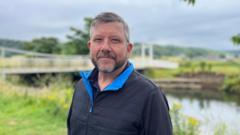Anglers are being threatened by illegal poachers on Wales' rivers, one group has said. One association said its members were coming across poaching gangs "all the time" leading to confrontations and "threats of violence". Another group spoke of finding badminton nets strung across rivers and said poachers had become "brazen" due to lack of enforcement, with serious impacts for endangered species such as salmon.
Natural Resources Wales (NRW) said it took illegal fishing "absolutely seriously", but did not have the luxury of "a bailiff on every river, all times of the day". In recent years anglers have been forced by law to release any salmon they catch - as well as sea trout over a certain size - due to dwindling populations. An NRW report warned last year that wild Atlantic salmon could disappear completely from Welsh rivers within two decades .

The log books of the Seiont, Gwyrfai and Llynfi Fishing Society in Gwynedd help tell the story in stark terms. More than 400 salmon were caught by anglers on the Seiont back in 1988 whereas more recently that has fallen to just two or three per year. Chairman Robin Parry, said it meant that any illegal fishing was all the more damaging.
"There's plenty of evidence that people are going in with snares, gaff hooks and nets and taking out the few adult salmon that have come back," he said. "It defies belief - we've taken out badminton nets several times - but others are proper nets with buoys across the top and weights." Huw Hughes, the association's secretary since 1979 and a retired detective said the situation was "out of control".
"It's so brazen that they advertise themselves on social media," he said, showing Facebook posts of young men holding up their catch. "Poaching now is more commercial - fresh salmon is very sought after, but unfortunately there isn't the stock to keep that up these days." Mr Parry said the society reported every incident of suspected illegal fishing it observed to NRW but "nothing seems to happen" and there needed to be more people "out and about".
The last time he had personally seen an NRW official out checking fishing licences was "six or seven years ago". At the other end of the country, on the River Ogmore near Bridgend, angler Mark Ryan said poaching was a "massive issue" and seemed to have got worse "in the last five to 10 years". As chairman of the Ogmore Angling Association he felt there had been "a real deterioration and influx of people just fishing illegally".
Recently one of his colleagues had been threatened by a gang of men and "chased" to his car, he explained. "You come down here to this idyllic, beautiful place for peace and tranquillity and to have that confrontation and violence is terrible." Another incident where individuals were allegedly taking "boot loads of fish" was filmed and reported to NRW, he said.
"They turned up a week later - after they'd left," he claimed. "The ability for people to come here and have no consequences for their actions, knowing they can chance their arm because there's no retribution - it's sad." Ben Wilson refuses to call it poaching.
The principal fisheries advisor for NRW explained that using that term makes a "very serious environmental crime" sound "benign". He said that while illegal fishing was not the key factor in declining salmon stocks, "any fish taken has a serious impact". He insisted NRW took the issue seriously, but did not have the staff numbers it wanted.
"In an ideal world we’d have a bailiff on every river, all times of the day, a 24-hour response," he said. "We don’t have the luxury of that, so we are increasingly dependent on getting reports and intelligence from people on the ground, mostly from anglers and fisheries." NRW has 28 staff with special authorisation to investigate fisheries offences.
However, these officers also have a wide range of other areas to deal with - including waste-related offences. In practice, BBC Wales was told there were only eight or 10 officers dedicated to fisheries. NRW figures show there were more than 200 reports of illegal fishing per year between 2021-23, with 250 in 2023.
In 2021, 25 of these were classed as high level, requiring an immediate response, with 31 in 2022 and 54 in 2023. Enforcement action led to 165 prosecutions over the past four years, most of which were for fishing without a licence. "When we get that intelligence we do put patrols together.
We can react" Mr Wilson said. "If you see some of the cases that we have been able to take to court recently, we’ve had some fairly hefty fines levied against people. "We are out there on the riverbank.
We’re routinely investigating those areas which are high risk and at those times of year which are high risk.".


















